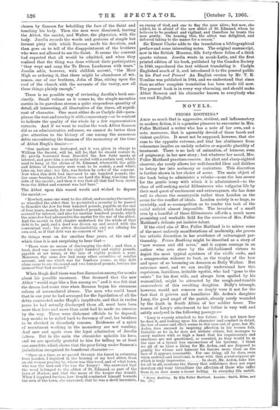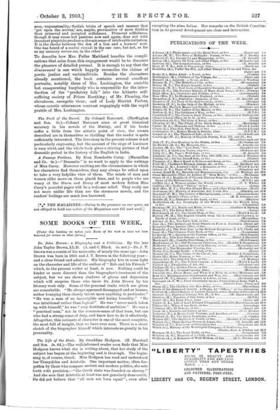NOVELS.
PRIORS ROOTHING.*
AMID so much that is aggressive, strident, and inflammatory in modern fiction, it is a genuine pleasure to encounter in Mrs. Fuller Maitland a writer who has a note of her own, and a note, moreover, that is agreeably devoid of these harsh and violent qualities. It must not be supposed, however, that she runs to the opposite extreme, and that her abstinence from vehemence implies an unduly sedative or soporific placidity of
treatment. There is no lack of animation, of humour, even of poignancy, in her new story ; but whatever her mood, Mrs. Fuller Maitland practises reserve. An alert and sharp-sighted observer, she rarely allows her well-founded likes and dislikes to betray her into acrimony or caricature. This discretion is further shown in her choice of scene. The main object of the book being to administer a rebuke—none the less severe for the gentle irony with which it is administered—to the class of self-seeking social filibusterers who vulgarise life by their mad quest of excitement and extravagance, she has done well to choose the countryside rather than London as the scene for the conflict of ideals. London society is so huge, so unwieldy, and so cosmopolitan as to render the task of the social satirist almost impossible. The invasion of a small area by a handful of these filibusterers affords a much more promising and workable field for the exercise of Mrs. Fuller alaitland's delicate yet incisive talent.
If the chief aim of Mrs. Fuller Maitland is to mirror some of the most unlovely manifestations of modernity, she proves her artistic discretion in her avoidance of extravagant par- tisanship. Priors Roothing might be described as a story of
new women and old acres," and it argues courage in an author who sets store by the old-fashioned virtues to depict the most typical specimen of the vieille roche, and a sexagenarian widower to boot, as the trophy of the bow and spear of so bouncing an Amazon as Dolly Walker. But extremes meet, and we can readily understand how this capricious, fastidious, irritable egotist, who had "gone to the saints" for his first wife, and always been spoiled by his womankind, might be attracted by the rough-and-tumble camaraderie of this revolting daughter. Dolly's triumph; however, would not concern us deeply were it not for the fact that it grieves and humiliates Mr. Arden's daughter Lucy, the good angel of the parish, already sorely wounded by the death in South Africa of her soldier lover. The reason of Lucy's attachment to her father is very well and subtly analysed in the following passage :— "Lucy is warmly attached to her father. I do not know how he does it, and looking upon his character and conduct in detail, the law of cause and effect seems in this case out of gear, but Mr. Arden does succeed in inspiring affection in his women folk. Irritable as lie is, he does not irritate others, but manages to carry matters with so high a hand that his requirements and exactions are not questioned, or resented, as they would be in the case of a tyrant less unconscious of his tyranny. I think we all of us have a liking for Mr. Arden, and are disposed to gratify his whims and humour his fancies more than on the face of it appears reasonable. For one thing, all he does, even when crabbed and irrational, is done with that grand-seigneur air which is truly impressive In short, Mr. Arden, take him for all in all, confirms the theory that selfishness does not repel devotion and wear threadbare the affection of those who suffer from it, as does many a lesser failing. In everyday life untidi_ • Priors Ropthing. By Ella Fuller Maitland. London: Smith, Elder, and Co. De.] ness,^unpunstuality,-foolish tricks of speech and manner that 'get upon the .nerves,' are, maybe, provocative of more friction than primeval and accepted selfishness. Primeval selfishness, though it may rouse hot passions now and again, does not with incessant pinpricks produce a chronic sense of intolerable irritation. It is the choice between the den of a, lion and a hornets' nest. One has heard of a modus vivendi in the one case, but not, as far as my memory serves me, in the other."
To describe how Mrs. Fuller Maitland handles the compli- cations that arise from this engagement would be to discount the pleasure of detailed perusal. It is enough to say that the
denouement is one which happily reconciles the claims of poetic justice and verisimilitude. Besides_ the characters already mentioned, the book contains several excellent portraits, notably those of Mrs. Lushington, the amiable but exasperating busybody who is responsible for the intro- duction of the "predatory folk" into the hitherto self-
sufficing society of Priors Roothing ; of Mr. Fleming, the chivalrous, energetic vicar; and of Lady Harriet Forbes, whose caustic utterances contrast -engagingly with the vapid prattle of Mrs. Lushington.



























































 Previous page
Previous page